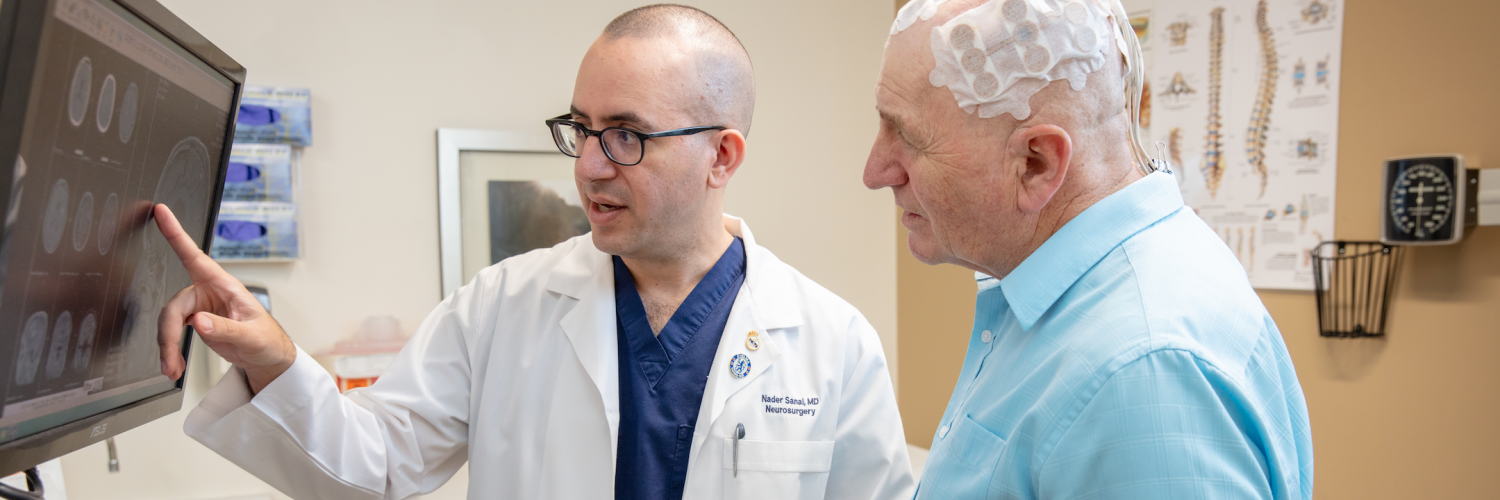A promising non-invasive treatment to effectively and safely destroy deadly brain tumors is being tested on human patients for the first time ever at the Ivy Brain Tumor Center at the Barrow Neurological Institute in Phoenix.
This new treatment has shown to be incredibly effective in treating aggressive brain tumors in animals, said Dr. Shwetal Mehta, a molecular neuro-oncologist and the chief operating officer and deputy director of the center.

Now, medical researchers are testing it on 30 human patients who have recurrent glioblastoma, the brain cancer that took the life of Arizona Senator John McCain in 2018.
“If this therapy works, it’s going to be amazing for the brain tumor community because it doesn’t require surgery, it’s non-invasive treatment and is specific for killing tumor cells so it’s everything that we would want for patients at the center,” Mehta said.
Instead of a scalpel, surgeons use a keyboard and a mouse. There is little to no risk of infection.
New drug-device combination offers hope for patients
The Ivy Brain Tumor Center is partnering with two companies whose separate therapies proved successful when combined together. The combination drug-device therapy, called sonodynamic therapy (SDT), is able to target deeper tissues like a brain tumor.

The drug, aminolevulinic acid (ALA), is taken up selectively by tumor cells and then is activated by ultrasound, effectively targeting only tumor cells for destruction.
“For some reason tumors love this drug and they light up under UV lights,” Mehta said.
The two companies involved in the collaboration and testing are:
SonALAsense, headquartered in Berkeley, California, the company develops and commercializes drug-device systems in photodynamic therapy and new drug therapies for glioblastoma multiforme and other deadly cancers.
InSightec, headquartered in Haifa, Israel, is a global medical technology innovator whose device performs incisionless surgery using focused ultrasound that is guided by MRI. The ultrasound is able to safely penetrate the blood-brain barrier, which has been one of the most significant challenges in the mission to treat brain cancer.
Therapy could turn lethal cancer into manageable disease
In animal trials, the treatment quickly killed brain tumor cells and at the same time triggered programmed tumor cell death within 48 hours. If the initial testing is shown to be safe and effective, it will be expanded to larger groups of patients.
“This novel modality has the potential to change the lives of hundreds of thousands of patients and their families, worldwide,” said Dr. Nader Sanai, director and chief scientific officer of the Ivy Brain Tumor Center.
Reaching across the globe to collaborate on rare diseases
The partnership between the center and the two companies illustrates the importance of global relationships in conquering rare diseases, said Dr. Arjun Desai, chief strategic innovation officer at InSightec.
“Collaboration is key to breaking down the barriers to treatment for diseases such as glioblastoma, where few effective therapeutic options have been brought forward in the past several decades,” Desai said.
Arizona-Israel relationship benefits both
The partnership also highlights Arizona’s ties with Israel as partners in trade and innovation.
In November 2019, the Arizona Commerce Authority opened the Arizona-Israeli Trade Office in Tel Aviv to strengthen its trade partnership with Israel as well as collaborate in areas like biotechnology, water conservation and farming.
“Because of the alignment in a host of industries between Israel and Arizona, it’s a natural fit,” said Glenn Hamer, president and CEO of the Arizona Chamber of Commerce & Industry. “Arizona’s reputation as a tech sector leader is growing, and Israel is a global tech leader.
“While Israel’s population is only about nine million, its tech footprint makes it a superpower. Over 300 major technology companies now have some sort of serious R&D presence in Israel, including Intel, the country’s largest private employer.
“Only the United States and China have more companies listed on NASDAQ with 20 percent of all of the venture capital investment in cyber goes to Israeli companies, and the country can go toe-to-toe in virtually all of the hottest emerging sectors, including artificial intelligence, biotech, water, agriculture, mobility, and, of course, defense.”
About the Ivy Brain Tumor Center
The nonprofit Ivy Brain Tumor Center conducts state-of-the-art clinical trials for brain tumor treatment. It was established in 2005 with a $50 million grant from the Ben & Catherine Ivy Foundation, the largest non-government organization supporter of brain tumor research in the world. The grant is the largest single research grant in the history of brain tumor research.
To read more about the center and its mission, visit: Ivy Brain Tumor Center
















Add comment